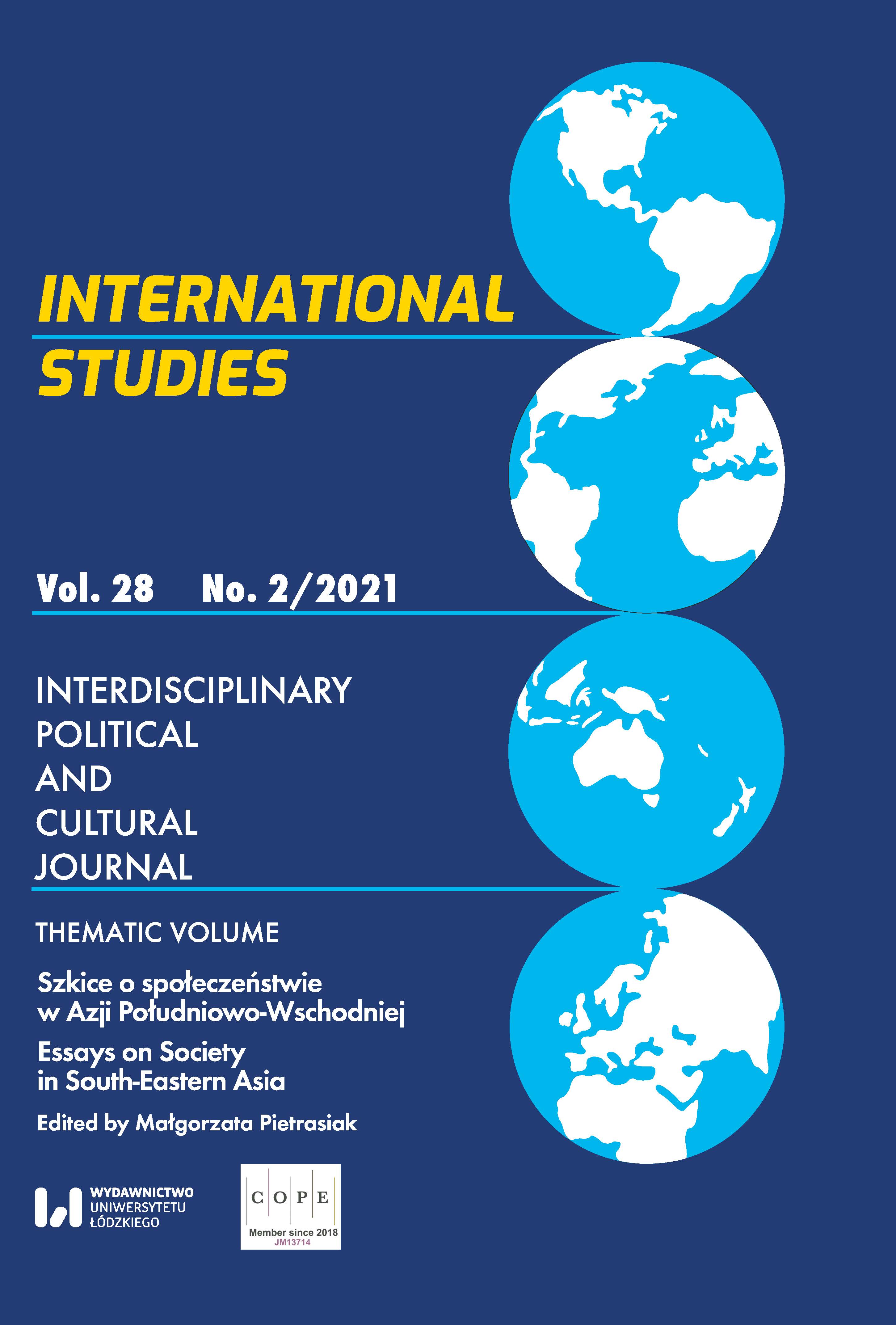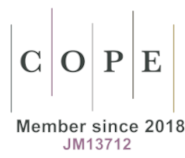Wielokulturowość a jedność narodowa – problemy społeczne w Malezji na przełomie XX i XXI wieku
DOI:
https://doi.org/10.18778/1641-4233.28.05Słowa kluczowe:
Malezja, społeczeństwo, Azja, etniczność, ekonomia, edukacjaAbstrakt
Malezja to zróżnicowany kulturowo i etnicznie kraj w Azji Południowo-Wschodniej. Celem niniejszego artykułu jest zbadanie przyczyn oraz wpływu braku spójności i integralności społeczeństwa Malezji na możliwości rozwoju tego kraju, a także sprawdzenie, czy tamtejszy rząd stara się zapobiegać podziałom społecznym. Przedstawiono również podstawowe informacje dotyczące Malezji oraz dokonano analizy wskaźników istotnych w ocenie rozwoju społecznego tego kraju. Na tym tle zaprezentowano wybrane problemy społeczno-ekonomiczne oraz możliwości rozwoju gospodarczego i społecznego Malezji w najbliższych latach.
Artykuł opiera się głównie na następujących opracowaniach: Budowa państwa w warunkach wieloetniczności. Przypadek Malezji Ewy Trojnar, Problem nierówności dochodowych i ubóstwo w wieloetnicznym społeczeństwie Malezji Pawła Glinika oraz Sexuality Education in Malaysia: Perceived Issues and Barriers by Professionals, którego autorami są Zahra Fazli Khalaf, Wah Yun Low, Effat Merghati-Khoei, Behzad Ghorbani. Postawiono wnioski, iż Malezja ze względu na swój intensywny rozwój gospodarczy może być dla partnerów i biednych krajów tego regionu Azji wzorem do naśladowania. Niestety, różnice w sytuacji prawnej poszczególnych grup etnicznych i rasowych, dysproporcje ekonomiczne czy brak odpowiedniej jakości kształcenia (nawet edukacji seksualnej) prowadzą do stagnacji społecznej. Rozwiązaniem mogłoby być przyjęcie do realizacji wybranych Celów Zrównoważonego Rozwoju określonych przez Organizację Narodów Zjednoczonych, które ugruntowałyby dalszy rozwój Malezji oraz poprawiły dobrostan jej obywateli. Malezja ma szansę wejść na drogę do stania się liderem w regionie Azji Południowo-Wschodniej, ale wymaga to wielu zmian społecznych, które powinny zostać wprowadzone jak najszybciej.
Pobrania
Bibliografia
Aun, L.H. „Malaysia’s New Economic Policy and the 30% Bumiputera Equity Target: Time for a Revisit and a Reset”. Web. 20.12.2021. https://www.iseas.edu.sg/articles-commentaries/iseas-perspective/malaysias-new-economic-policy-and-the-30-bumiputera-equity-target-time-for-a-revisit-and-a-reset-by-lee-hwok-aun/
Zobacz w Google Scholar
Gliniak, P. „Problem nierówności dochodowych i ubóstwa w wieloetnicznym społeczeństwie Malezji”. Społeczeństwo i Ekonomia 2.4 (2015): 49–67. Web. 10.06.2021. https://www.wir.ue.wroc.pl/docstore/download/WUTdc44036af66a483a976370f93e3e7db6/Gliniak_Problem_nierownosci_dochodowych_i_ubostwa.pdf
Zobacz w Google Scholar
Granhenat, M., Abdullah, A.N. „Using National Identity Measure (NIM) as an Indicator of Malaysian National Identity”. Journal of Nusantara Studies 2.2 (2017): 214–223. http://dx.doi.org/10.24200/jonus.vol2iss2pp214-223
Zobacz w Google Scholar
Jelonek, A., Trojnar, E. Malezja. Warszawa: Wydawnictwo Trio, 2009.
Zobacz w Google Scholar
„Key Messages”. Malaysia’s Voluntary National Review (VNR) 2021. Web. 20.12.2021. https://sustainabledevelopment.un.org/memberstates/malaysia/
Zobacz w Google Scholar
Khalaf, Z.F., Yun Low, W., Merghati-Khoei, E., Ghorbani, B. „Sexuality Education in Malaysia: Perceived Issues and Barriers by Professionals”. Asia Pacific Journal of Public Health 26.4 (2014). https://doi.org/10.1177/1010539513517258/
Zobacz w Google Scholar
Malaysia – GINI index. Knoema. Web. 28.06.2021. https://knoema.com/atlas/Malaysia/topics/Poverty/Income-Inequality/GINI-index#:~:text=Malaysia%20GINI%20index%20was%2042.8,is%20available%20at%20the%20moment/ https://knoema.com/atlas/Malaysia/topics/Poverty/Income-Inequality/GINI-index
Zobacz w Google Scholar
Malezja, Ministerstwo Rozwoju, Pracy i Technologii, Departament Handlu i Współpracy Międzynarodowej. Web. 10.06.2022. https://www.gov.pl/attachment/9e4d94ea-1ba5-411d-a0b5-7b9700678b8a
Zobacz w Google Scholar
„Malezja. Ustrój polityczny”. Encyklopedia Powszechna PWN. Web. 14.05.2021. https://encyklopedia.pwn.pl/haslo/Malezja-Ustroj-polityczny;4574725.html
Zobacz w Google Scholar
Malik, M. „Membebaskan sekolah dari salah laku seksual”. Web. 20.12.2021. https://maszlee.com/2021/05/membebaskan-sekolah-dari-salah-laku-seksual/
Zobacz w Google Scholar
PKB – lista krajów. Trading Economics. Web. 28.06.2021. https://pl.tradingeconomics.com/country-list/gdp
Zobacz w Google Scholar
Rezolucja przyjęta przez Zgromadzenie Ogólne NZ w dniu 25 września 2015 r. Przekształcamy nasz świat: Agenda na rzecz zrównoważonego rozwoju 2030, A/RES/70/1. Web. 20.12.2021. http://www.unic.un.org.pl/files/164/Agenda%202030_pl_2016_ostateczna.pdf
Zobacz w Google Scholar
Trojnar, E. „Budowa państwa w warunkach wieloetniczności. Przypadek Malezji”. Krakowskie Studia Międzynarodowe 1 (2011): 133–145. Web. 28.06.2021. https://repozytorium.ka.edu.pl/handle/11315/23196
Zobacz w Google Scholar
United Nations Development Programm. Human Development Data Center. Web. 28.06.2021. http://hdr.undp.org/en/data
Zobacz w Google Scholar
World Health Rankings. Web. 24.05.2021. https://www.worldlifeexpectancy.com/pl/malaysia-life-expectancy
Zobacz w Google Scholar
Wrona, J. „Analiza wyglądu i symboliki flag oraz herbów współczesnych państw Azji Południowo-Wschodniej”. Zeszyty Naukowe Uniwersytetu Ekonomicznego w Krakowie 842 (2010): 9–10. Web. 29.06.2021. https://r.uek.krakow.pl/handle/123456789/846
Zobacz w Google Scholar
Opublikowane
Wersje
- 2023-06-15 - (2)
- 2023-05-29 - (1)
Jak cytować
Numer
Dział
Licencja

Utwór dostępny jest na licencji Creative Commons Uznanie autorstwa – Użycie niekomercyjne – Bez utworów zależnych 4.0 Międzynarodowe.

















